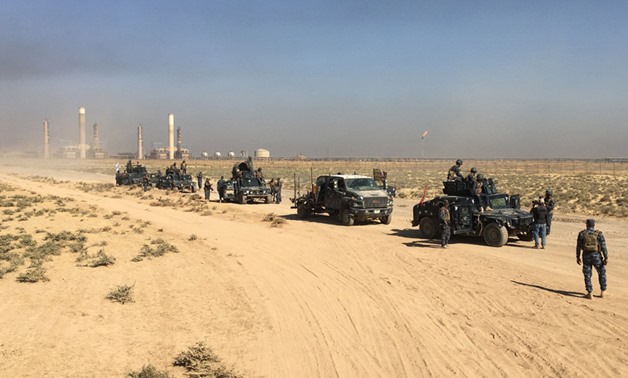
Members of Iraqi federal forces enter oil fields in Kirkuk, Iraq October 16, 2017. REUTERS/Stringer
CAIRO – 16 October 2017: Last night, Prime Minsiter of Iraq Haider al-Abadi ordered the Iraqi security forces to push forward from their holding positions just south of Kirkuk and secure essential strategic locations in and around the city.
The Iraqi government has threatened the Kurdish region since the Kurdish independence referendum on September 25. The threats finally materialized into a demonstration of military strength as Iraqi media showed a procession of armored vehicles and security forces flooding north in the past week. People began to predict a major confrontation between the Kurdish Peshmerga forces and the Iraqi security forces.
The Middle East is often likened to a puzzle; the pieces are mismatched and overlapping. However, the current situation in Kirkuk goes beyond this; it feels like someone has rolled a dice in a game of chess, and then a third player slapped down a straight flush.
Wrap your head around this. Iran, the U.S.’s foremost adversary, is indirectly engaged in violent conflict alongside Iraq, a major U.S. regional ally, against the Kurds. The Kurds being the U.S.’s most significant non-state ally in the fight against the Islamic State, the U.S.’s biggest non-state opponent.
You think that is confusing? What complicates the situation even further for the U.S. is that they provided the vast deal of military hardware and training that are being used in this conflict, to both Iraq and the Kurds. The U.S.-led state-building project in Iraq required the U.S. to bolster Iraqi security services; the same rang true as the Kurds showed their strength and ability in combating the Islamic State’s advances.
To see the most striking evidence of this, one only has to look at the transport being used by all parties. Humvees are a symbol of U.S. military around the world, and their presence on the ‘battlefield’ in and around Kirkuk makes it difficult for the mind to remove the U.S. from the equation.
The enveloping conflict in and around Kirkuk comes as another slap in the face to U.S. foreign policy in Iraq, which welcomes short-term success only and fails to appreciate the intricacies of the country.
More money does not equate to more success.
 Iraqi forces drive towards Kurdish Peshmerga positions on Sunday on southern outskirts of Kirkuk. AFP
Iraqi forces drive towards Kurdish Peshmerga positions on Sunday on southern outskirts of Kirkuk. AFP
Many of the PMF militia involved in the Kirkuk campaign pledge allegiance to the Supreme Leader of Iran Ayatollah Ali Khamenei, and thus we would not expect to see them using American military hardware. But this is the Middle East, so obviously this is not the case. American weaponry is being used by every actor in this conflict as loyalties in Iraq change quicker than the weather in a British summer.
This is the largest conflict between the Iraqi state and the Kurds in the post-Saddam era. One can only wish, pray, lobby – do whatever is necessary – to make the advantages of diplomacy trump those of conflict.
With vast sources of funding and support, it is unlikely that the Iraqi government will adopt this stance. Abadi has frequently been criticized as being a weak leader in the face of adversities, and with elections upcoming in 2018 this could be his one chance to bolster his position in order to remain the head of government and the commander-in-chief of the armed forces.

Comments
Leave a Comment